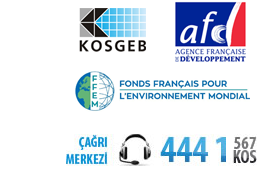ENERGY EFFICIENCY PROJECT IN SMEs
Turkey is a rapidly rising industrial power. Industry, and in particular SMEs, are at the core of Turkey’s economic development. Most of the 3.5 million enterprises in Turkey 99.88 % are SMEs (3,470,720), of which 94,40% at micro scale while 4.78 % small scale and 0.69 % at medium scale.
The very important role of SMEs in the Turkish economy is characterised by a few key figures;
Turkey’s enterprises are thus more and more often present on the international market, and are confronted with increased competition, notably from low cost Asian manufacturers. In Turkey as in the world, SMEs are very significant for the economic and social life of Turkey. They are major sources of employment, production and tax incomes.
For this reason, KOSGEB put energy efficiency on its agenda by taking into account national and international conjuncture in 2008 and a support program was launched in order to identify energy efficiency opportunities in SMEs and provide related training and consulting services in this area to SMEs.
Moreover, KOSGEB has started a Project called “Energy Efficiency Project in SMEs” with the financial support of the French Development Agency.in order to increase SMEs’ knowledge and experience and awareness about energy efficiency and to use existing support program more effective. With this Project it is expected to reduce the pressure of energy cost in SMEs which is especially vital for some SMEs and thereby the reduce the pressure of energy import cost in Turkish Economy. Also it is expected to create significant jobs and employment potential and to contribute to disseminate the energy efficiency culture both in SMEs and country level.
Project” started with a Financing Agreement signed between KOSGEB and the French Development Agency (AFD) on 20th June 2011. Project activities has officially been launched as of June 26, 2013. Project activities has been carried out by a Consortium consisting Turkish and French experts CETIAT-EPSILON-YEŞİL GÜÇ;
The project aims to increase energy efficiency in Turkey by providing energy efficiency implementation, low-carbon energy use and improvement environmental performance in SMEs. Total project butged is 3 Million EURO with a KOSGEB participation and in-kind contribution and will be implemented in a 3 years period.
|
Project Butged and Distribution |
|
| KOSGEB Contribution
In-kind Contribution Cash Contribution
|
1.310.960 EURO
917.600 EURO ((Project Team and Other Contribution) 393.360 EURO (KOSGEB Supports to be used for applications in SMEs)
|
| AFD Contribution
Remuneration Audit expenses
|
1.500.000 EURO
1.320.038 EURO (Project Agreement signed with CETIAT) 179.962 EURO |
Main Targets of the Project
- To strength KOSGEB in its new mandate to promote EE in SMEs,
- To develop a new finance model for KOSGEB to support EE in SMEs by reviewing the existing EE supports and financing legislation,
- To contribute to the development of EE market by applying EE demonstration projects for SMEs,
- To increase awareness of energy efficiency in SMEs in order to reduce energy costs and to contribute to increasing the competitiveness
Project Objective:
The ultimate objective of the project is to contribute to improve energy efficiency and environmental performance of Turkish SMEs (industry and services).
The project intermediate objectives are to support KOSGEB in fulfilling its new mandate on EE through the two following main objectives:.
- Strengthen the institutional and incentive framework for promoting energy efficiency to SME
- Contribute to develop an energy efficiency market in the SME sector.
Project Components
Component 1: Strengthening KOSGEB in its new mandate to promote EE in SMEs
The main objective of the components, strengthening of KOSGEB on energy efficiency services and of making recommendations to SMEs
- Sub Component 1.1: Developing an Energy Efficiency Strategy and an Action Plan for KOSGEB on SMEs including financing and support programme
- Sub Component 1.2: Developing training plan and implementation of trainings on EE
- Sub Component 1.3: Developing Information and Monitoring System on Energy Consumption of SMEs and Energy Efficiency Investment
Component 2: Supporting EE demonstrations in the SMEs from a perspective of replicating know-how (Pilot Phase)
The main objective of the components is to strength KOSGEB project team with pilot phase implementations on EE services.
- Sub Component 2.1: Defining the Scope and Preparing the Pilot Phase
- Sub Component 2.2: Pilot phase implementations (Pre-audits, detailed audits, implementations)
- Sub Component 2.3: Capitalisation of Lessons Learned from the Pilot Phase
Component 3: Communication and development of an EE market for the SMEs
The main objective of the components is to prepare a communication plan and campaign in order to increase awareness of SMEs on energy efficiency and implementation
- Sub Component 3.1: Definition of a Communication Plan and Campaign for KOSGEB to Carry Out Its New Mandates
- Sub Component 3.2: Awareness-raising, Information and Training Campaigns for SMEs and Professional Associations
- Sub Component 3.3: Training on Energy Third Party Financing (TPF) and Performance Contracting (EPC)
- Sub Component 3.4: Establishing partnerships With Public Actors to Encourage Energy Efficiency Measures and Financing
Component 4: Setting up a Project management Unit (PMU) and assisting the project ownership
This component covers creation of KOSGEB EE team and the main administrative and structural issues
Project will be carried out with close collaboration. The target groups of the Project are KOSGEB, SMEs,ESCOs, Supply and Service Providers and Related Instutitions and Organisation on Energy Efficiency.
Project Presentation_06 May 2014


![xMv2AGr[1]](http://kobienver.com/en/wp-content/uploads/2014/03/xMv2AGr1.png)

